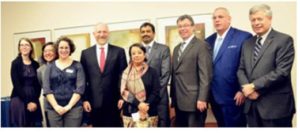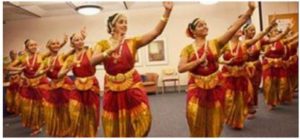By Premlata Venkataraman
e-mail: Â ThePatrika@aol.com
The University of Pittsburgh’s Center of International Studies hosted a reception for Riva Ganguly Das, India’s Consul General at New York on Thursday, November 10 at the Barco Law Building. The faculty, uniÂversity officials and invited members of the Indian community attended the reception.
Consul GenÂeral Ganguly Das has served in many countries before her assignment in New York. In her general remarks, she said, in her postings to many countries she always was impressed by the vibrancy of people of Indian origin living there, and how well they socially and culturally have adapted themselves to their new environments even as they retained their cultural identity. In this respect, Pittsburgh’s Indian-American community is a fine example, she said. India considers the people of Indian origin living outside India as a big asset in strengthening its bilateral relationship in these countries.

L to R: Rachel Jacobson, Lynn Kawaratani, Emily Rook-Koepsel , Ariel Armony, Consul General Riva Ganguly Das, Consul Trade Sreenivasa Rao Gudavalli, James Cook, Ira Gumberg at Pitt’s Asian Studies Center, and Chancellor Emeritus Mark Nordenberg.
She also pointed out that India is trying to learn from the dynamic and interdisciplinary academic environment in leading US academic institutions such as Pitt, and adapt it in top-of-the-line Indian academic institutions.
Earlier, Prof. Ariel Armony, the director of the university’s InternaÂtional Programs, highlighted the number of international students from India at Pitt. He also described the features of the South Asia Initiative, Pitt’s 3-year program focusing on the region in which India is front and center, geographically, culturally and technologically as well. India’s recent economic growth is an added new dimension. For the 2016-17 academic year, one interesting topic is India and Pakistan at 70: AspiraÂtions and Speculations. See the details here: www.ucis.pitt.edu/asc/events/southasia.
Mark Nordenberg, the Chancellor Emeritus of the University, in introducing the consular official, recalled India’s long tradition of learnÂing, teaching and transmitting knowledge accumulated from generation to generation spanning over four millennia. He acknowledged India’s comÂmitment to nonviolence, tracing it from the Mauryan emperor Ashoka, who lived 300 years before the Common Era to Mahatma Gandhi’s comÂmitment to civil disobedience and ahimsa.
Prof. James Cook, the acting director of the Asian Studies CenÂter, effortlessly emÂceed the events of the evening, starting with Bharatanatyam pieces by Pitt’s Nrityamala, a group of mostly Indian-American undergraduÂate students.
evening, starting with Bharatanatyam pieces by Pitt’s Nrityamala, a group of mostly Indian-American undergraduÂate students.
In responding to a question in the wake of the unexpected outcome of the US presidential elections, she said the US and India are mature democracies, with elections leading to a very peaceful transfer of power. She said, “The US-India bilateral relations can only go from strength to more strength because of the convergence of interests.â€
Note: The University of Pittsburgh offers Hindi courses. For details, contact Dr. Sugandha Verma at 724-934-4376.    ♣
